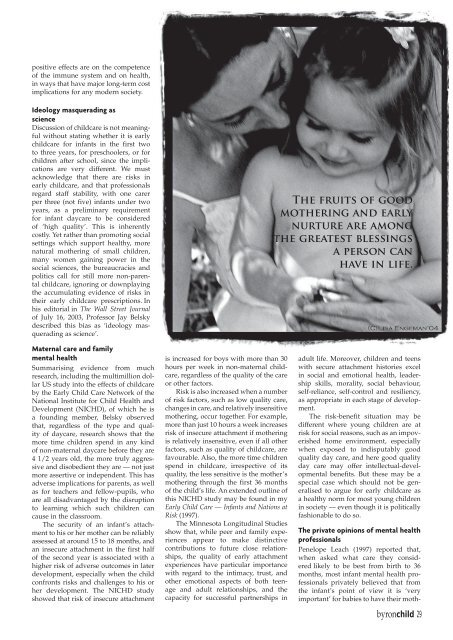byronchild - logo
byronchild - logo
byronchild - logo
You also want an ePaper? Increase the reach of your titles
YUMPU automatically turns print PDFs into web optimized ePapers that Google loves.
positive effects are on the competence<br />
of the immune system and on health,<br />
in ways that have major long-term cost<br />
implications for any modern society.<br />
Ideology masquerading as<br />
science<br />
Discussion of childcare is not meaningful<br />
without stating whether it is early<br />
childcare for infants in the first two<br />
to three years, for preschoolers, or for<br />
children after school, since the implications<br />
are very different. We must<br />
acknowledge that there are risks in<br />
early childcare, and that professionals<br />
regard staff stability, with one carer<br />
per three (not five) infants under two<br />
years, as a preliminary requirement<br />
for infant daycare to be considered<br />
of ‘high quality’. This is inherently<br />
costly. Yet rather than promoting social<br />
settings which support healthy, more<br />
natural mothering of small children,<br />
many women gaining power in the<br />
social sciences, the bureaucracies and<br />
politics call for still more non-parental<br />
childcare, ignoring or downplaying<br />
the accumulating evidence of risks in<br />
their early childcare prescriptions. In<br />
his editorial in The Wall Street Journal<br />
of July 16, 2003, Professor Jay Belsky<br />
described this bias as ‘ideology masquerading<br />
as science’.<br />
Maternal care and family<br />
mental health<br />
Summarising evidence from much<br />
research, including the multimillion dollar<br />
US study into the effects of childcare<br />
by the Early Child Care Network of the<br />
National Institute for Child Health and<br />
Development (NICHD), of which he is<br />
a founding member, Belsky observed<br />
that, regardless of the type and quality<br />
of daycare, research shows that the<br />
more time children spend in any kind<br />
of non-maternal daycare before they are<br />
4 1/2 years old, the more truly aggressive<br />
and disobedient they are — not just<br />
more assertive or independent. This has<br />
adverse implications for parents, as well<br />
as for teachers and fellow-pupils, who<br />
are all disadvantaged by the disruption<br />
to learning which such children can<br />
cause in the classroom.<br />
The security of an infant’s attachment<br />
to his or her mother can be reliably<br />
assessed at around 15 to 18 months, and<br />
an insecure attachment in the first half<br />
of the second year is associated with a<br />
higher risk of adverse outcomes in later<br />
development, especially when the child<br />
confronts risks and challenges to his or<br />
her development. The NICHD study<br />
showed that risk of insecure attachment<br />
is increased for boys with more than 30<br />
hours per week in non-maternal childcare,<br />
regardless of the quality of the care<br />
or other factors.<br />
Risk is also increased when a number<br />
of risk factors, such as low quality care,<br />
changes in care, and relatively insensitive<br />
mothering, occur together. For example,<br />
more than just 10 hours a week increases<br />
risk of insecure attachment if mothering<br />
is relatively insensitive, even if all other<br />
factors, such as quality of childcare, are<br />
favourable. Also, the more time children<br />
spend in childcare, irrespective of its<br />
quality, the less sensitive is the mother’s<br />
mothering through the first 36 months<br />
of the child’s life. An extended outline of<br />
this NICHD study may be found in my<br />
Early Child Care — Infants and Nations at<br />
Risk (1997).<br />
The Minnesota Longitudinal Studies<br />
show that, while peer and family experiences<br />
appear to make distinctive<br />
contributions to future close relationships,<br />
the quality of early attachment<br />
experiences have particular importance<br />
with regard to the intimacy, trust, and<br />
other emotional aspects of both teenage<br />
and adult relationships, and the<br />
capacity for successful partnerships in<br />
The fruits of good<br />
mothering and early<br />
nurture are among<br />
the greatest blessings<br />
a person can<br />
have in life.<br />
adult life. Moreover, children and teens<br />
with secure attachment histories excel<br />
in social and emotional health, leadership<br />
skills, morality, social behaviour,<br />
self-reliance, self-control and resiliency,<br />
as appropriate in each stage of development.<br />
The risk-benefit situation may be<br />
different where young children are at<br />
risk for social reasons, such as an impoverished<br />
home environment, especially<br />
when exposed to indisputably good<br />
quality day care, and here good quality<br />
day care may offer intellectual-developmental<br />
benefits. But these may be a<br />
special case which should not be generalised<br />
to argue for early childcare as<br />
a healthy norm for most young children<br />
in society — even though it is politically<br />
fashionable to do so.<br />
The private opinions of mental health<br />
professionals<br />
Penelope Leach (1997) reported that,<br />
when asked what care they considered<br />
likely to be best from birth to 36<br />
months, most infant mental health professionals<br />
privately believed that from<br />
the infant’s point of view it is ‘very<br />
important’ for babies to have their moth-<br />
<strong>byronchild</strong> 29


